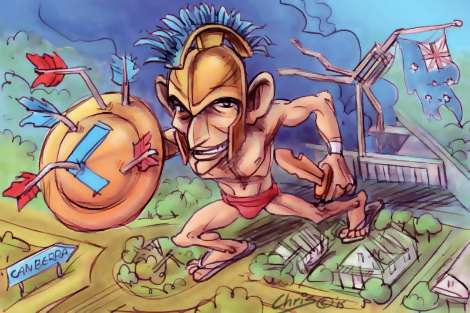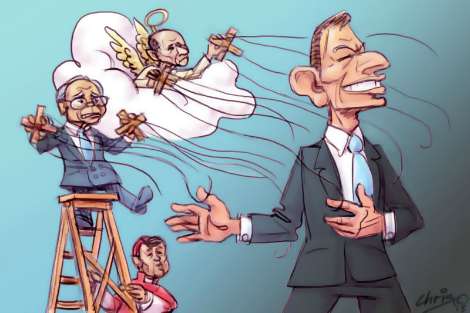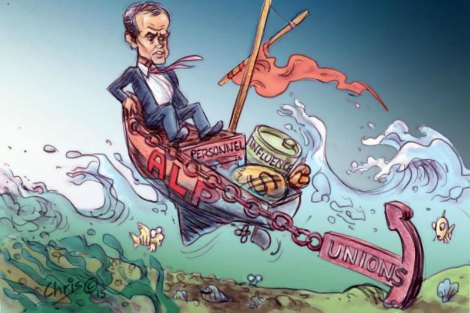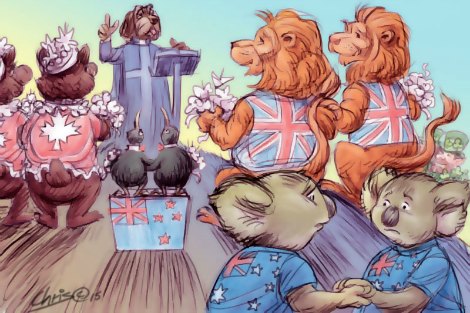Keywords: Democratic Labor Party
-

INTERNATIONAL
- J. R. Hennessy
- 19 February 2016
24 Comments
The aftershocks of the late-century push for liberalisation and the GFC have bred generations of dislocated voters who seek answers outside of the limited solutions of centrist governance. This provides ample opportunity for true progressive change, as seen in Europe and Latin America, and now the US and UK. Where's Australia? Nowhere to be seen. It is hard to imagine a truly progressive candidate emerging from our ossified political structures. There are a few reasons for this.
READ MORE 
-

INTERNATIONAL
- Fatima Measham
- 05 February 2016
9 Comments
The Bernie Sanders phenomenon in the US, like Corbyn in the UK and Podemos in Spain, demonstrates the rhetorical potency of renewal; of politics not as usual. It is the sort of thing that resonates with disaffected young people. While it is not entirely sensible to extrapolate developments in the US to Australia, it is worth speculating on the impact of our own changing demographics. Are the major parties equipped to take advantage of these shifts? Are they appealing to a new Australia that is already here?
READ MORE 
-

RELIGION
- Frank Brennan
- 04 December 2015
1 Comment
'Tonight, gathered here in the Southern Cross Club in the national capital, gathered as Eureka's children. We affirm that there is room for everyone under the Southern Cross. I hope you will return to Canberra carrying the Southern Cross flag when we proclaim the Australia Republic on 1 January 2020 which will be two elections after Australia last had a monarchist leader of a major political party. Tony Abbott is the last of his type. Whether the prime minister honoured to witness the proclamation is Malcolm Turnbull, Bill Shorten or another matters not.' Annual Dinner for Eureka's Children, Southern Cross Club, Canberra, 3 December 2015.
READ MORE
-

AUSTRALIA
- Tim Robertson
- 25 November 2015
17 Comments
The vitriol with which much of the liberal mainstream media responded to Tony Abbott's Margaret Thatcher memorial speech last month confirmed what many rightwingers have been claiming: that Abbott's problem was not his policies, but his inability to sell them. As communicators, he and Turnbull are poles apart. To date, the most striking achievement of the Malcolm Turnbull confidence trick is that he's rewarded for his apparent progressivism, even when he speaks explicitly against it.
READ MORE 
-

- Frank Brennan
- 18 September 2015
Pope Francis's concerns are not narrowly dogmatic or pedagogical but universally pastoral. He knows that millions of people, including erstwhile Catholics, are now suspicious of or not helped by notions of tradition, authority, ritual and community when it comes to their own spiritual growth which is now more individual and eclectic. He wants to step beyond the Church's perceived lack of authenticity and its moral focus on individual matters, more often than not, sexual. He thinks the world is in a mess particularly with the state of the planet — climate change, loss of biodiversity and water shortages, but also with the oppression of the poor whose life basics are not assured by the operation of the free market, and with the clutter and violence of lives which are cheated the opportunity for interior peace. He is going to great pains to demystify his office. He wants all people of good will to emulate him and to be both joyful and troubled as they wrestle with the probl
READ MORE
-

AUSTRALIA
- Andrew Thackrah
- 15 September 2015
24 Comments
After Malcolm Turnbull announced on Monday afternoon that he was challenging Tony Abbott for the LIberal leadership, commentators were unanimous in their speculation that Abbott would not give up the prime ministership without a fight. The pugnaciousness that characterised his political style was similarly part of the playbook of Canadian PM Stephen Harper, who was also seen to base his interaction with political adversaries on their 'standing' rather than debating policy. In Abbott's case this turned out to be a fatal flaw.
READ MORE 
-

AUSTRALIA
- John Warhurst
- 01 September 2015
18 Comments
There is always an appetite for anything linking Tony Abbott and Bob Santamaria. The journalist in Abbott has encouraged observers to play up the links, even though it has never been entirely clear what he is saying. He has explained that he was impressed as a young man by Santamaria’s courage as an 'advocate for unfashionable truths’, but he also pays his public dues to a number of prominent figures including John Howard, Cardinal George Pell, John Hewson, Bronwyn Bishop and even Pope Benedict XVI.
READ MORE 
-

- Frank Brennan
- 01 September 2015
1 Comment
If you want to form government in Australia and if you want to lead the Australian people to be more generous, making more places available for refugees to resettle permanently in Australia, you first have to stop the boats. If you want to restore some equity to the means of choosing only some tens of thousands of refugees per annum for permanent residence in Australia from the tens of millions of people displaced in the world, you need to secure the borders. The untrendy truth is that not all asylum seekers have the right to enter Australia but that those who are in direct flight from persecution whether that be in Sri Lanka or Indonesia do, and that it is possible fairly readily (and even on the high seas) to draw a distinction between those in direct flight and those engaged in secondary movement understandably dissatisfied with the level of protection and the transparency of processing in transit countries such as Malaysia and Indonesia. The popular evil is that political
READ MORE
-

INTERNATIONAL
- Daniel Read
- 18 August 2015
12 Comments
The ongoing drama over leadership of the UK Labour Party is raising the possibility of further fractures in the politics of austerity, not just in Britain, but across Europe. The entire political edifice of British politics has shifted so far to the right that even a somewhat inoffensive endorsement of state ownership, anti-austerity politics and trade union support, alongside scrapping the UK's nuclear deterrent and questioning our continued membership in NATO, can appear dangerously radical.
READ MORE 
-

AUSTRALIA
- Clancy Wright
- 17 August 2015
17 Comments
Sixteen and 17-year-olds shape society and culture through language, music, sport, arts and fashion. They challenge boundaries and push cultural trends up through our social fabric. They engage with technology and future ideas in a way that many older generations would fine overwhelming and confusing. We need this enthusiasm, this creativity and proven inclination to take risks in order to question our society's established methods and bring colour and life back to the broader political debate.
READ MORE 
-

AUSTRALIA
- John Warhurst
- 03 August 2015
15 Comments
The formal link between trade unions and the Labor Party is sacred in many quarters, and has sustained both sides of the relationship for 120 years. The revelations of the Royal Commission into Trade Union Governance and Corruption, despite its anti-Labor political origins, may eventually generate change. But the question has been around for decades, and any move to break the link would be vigorously opposed.
READ MORE 
-

AUSTRALIA
- John Warhurst
- 01 June 2015
71 Comments
Whatever one's position on the introduction of same sex marriage, it's clear that Australia now lags well behind the Western world, including many comparable countries such as the UK and New Zealand. This contrasts with 120 years ago around the time of Federation, when Australia was a leader on issues such as votes for women, other democratic reforms such as the secret ballot, and a living wage. Our country is now a laggard.
READ MORE 